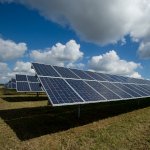World Energy Efficiency Day Date in the current year: March 5, 2026
 World Energy Efficiency Day is celebrated annually on March 5. It was created to raise global awareness about the need to make our energy consumption more efficient and transition to sustainable energy sources.
World Energy Efficiency Day is celebrated annually on March 5. It was created to raise global awareness about the need to make our energy consumption more efficient and transition to sustainable energy sources.Efficient energy use, commonly referred to as simply energy efficiency, is the process of reducing the amount of energy required to produce products and services. It is regarded as one of the twin pillars of sustainable energy policy, along with renewable energy.
Energy efficiency can be achieved through various means: the use of cutting-age appliances and vehicles that consume significantly less energy than older models, building insulation, optimization of industrial processes, using LED lamps or fluorescent lighting instead of incandescent light bulbs, using natural light and cooling wherever possible, reducing or removing energy subsidies that often result in inefficient energy use and high energy consumption, and more.
Energy efficiency is related to energy conservation, and the boundary between the two may get blurry at times, but these are two different concepts, although it can be argued that energy efficiency is a method of energy conservation. Energy conservation focuses on using less energy by adjusting your behaviors and habits, whereas energy efficiency involves reducing your energy consumption by using less energy-consuming technology. For example, heating your room less in winter is energy conservation, whereas using a smart thermostat to control the temperature in your home is energy efficiency.
Energy efficiency has many benefits on individual, local, national, and global levels. These benefits can be split into several main groups:
- Environmental. Energy efficiency contributes to the reduction of greenhouse emissions and other types of pollution.
- Economic. Improving energy efficiency can reduce production costs for manufacturers (even though implementing energy-efficient technology requires initial investments, it is cost-saving in the long run) and lower utility bills for consumers. On a national level, it helps stabilize electricity prices and makes countries less reliant on energy imports, improving their energy security.
- Utility system benefits. Energy efficiency lowers overall energy demand and thus reduces the need to invest in new infrastructure for electricity generation and transmission.
World Energy Efficiency Day was inaugurated at the First International Meeting on Energy Efficiency held in Austria in March 1998, where more than 350 experts from 50 countries discussed strategies to address the global energy crisis and work out possible solutions. The event received little media coverage, but World Energy Efficiency Day has been observed every year since its inaugural celebration on March 5, 1999.
The main goals of World Energy Efficiency Day are to highlight the need to reduce the use of fossil fuels, transition to sustainable energy sources, and encourage efficient energy use in all spheres. The observance also aims to facilitate international cooperation in promoting energy efficiency measures.
- Category
- International Observances, Ecological Observances
- Tags
- World Energy Efficiency Day, international observances, environmental observances, energy efficiency, energy conservation